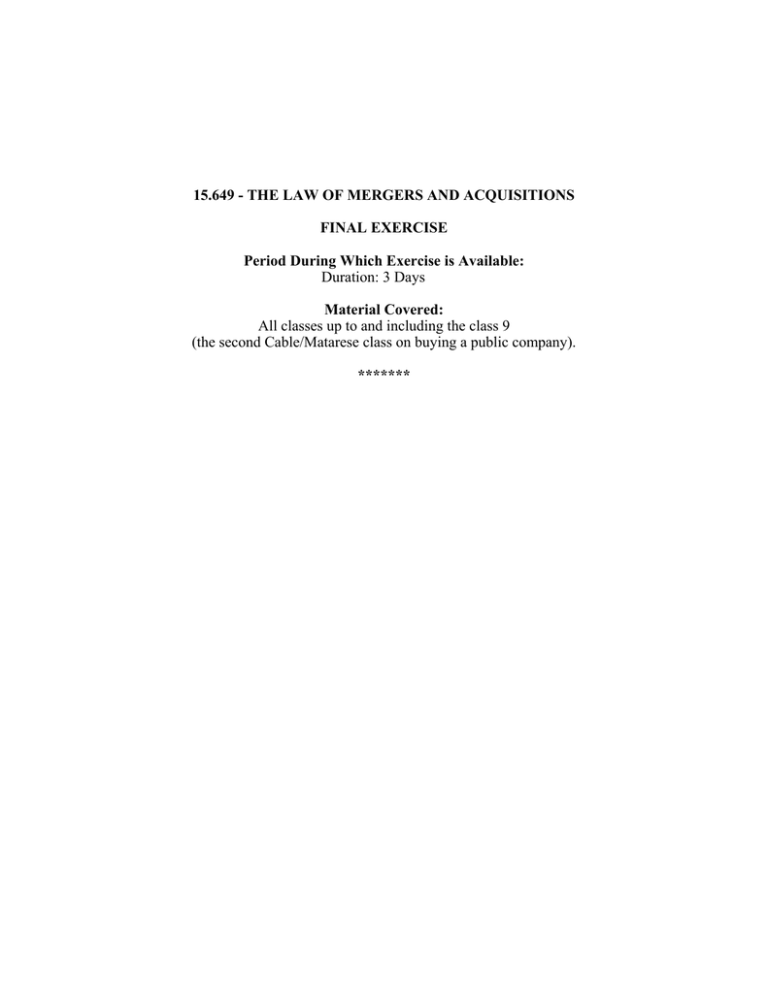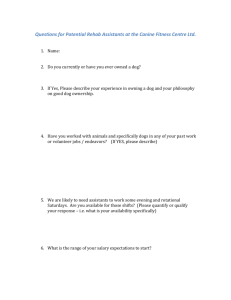15.649 - THE LAW OF MERGERS AND ACQUISITIONS FINAL EXERCISE
advertisement

15.649 - THE LAW OF MERGERS AND ACQUISITIONS FINAL EXERCISE Period During Which Exercise is Available: Duration: 3 Days Material Covered: All classes up to and including the class 9 (the second Cable/Matarese class on buying a public company). ******* INSTRUCTIONS AND ADVICE 1. Schedule and timing. Make arrangements with the TA to have the exam e-mailed to you at a mutually convenient time, and then within five hours e-mail back to the TA the completed exam. Keep a hard and computer-readable copy of your exam. 2. Sources and communication among students: During the period the exercise is available, students may not consult with each other about the course. For the exercise, you may consult the text, the readings, and any notes prepared by you, but no other sources. (Since your answers will be evaluated in terms of the course readings and the lectures, especially the readings, consulting other sources would not likely do much good.) You will want to have available to you a complete set of the required readings, including any sample documents. 3. Weighting and strategy: There are three questions. Answer all three. They will be weighted equally. Each particular point you should address appears in a sentence ending with a “?” Don’t neglect to respond to each “?” 4. Format and submission of answers: Your answer should have a cover sheet which includes your name, “ESL” if English is your second language, and the exact word count for the entire document. Start the answer to each question on a fresh sheet. Your entire submission should not exceed 1,500 words. 5. Some general advice (READ THIS CAREFULLY): You are not supposed to be a lawyer, and I don’t expect you to have definite answers to legal questions. You are supposed to be a manager with the ability to make a preliminary assessment of legal problems. Each exam question will ask you to address legal issues in a business context from the point of view of a manager. It doesn’t matter much if I don’t agree with your judgment as to how serious a risk or problem is, so long as you spot it and understand the legal and managerial implications of it. Your answers should demonstrate your understanding of and ability to express broad legal concepts, and your ability to spot where and how the law will have an impact on a business problem and the individuals involved. It will not be necessary to cite specific cases or statutes. Make sure that your answer focuses on how general legal principles apply to the facts you have been given. To the extent that the facts are not as specific as you would like them to be for your assessment, point that out. You shouldn’t concern yourself with implausible possibilities. I don’t try to “trick” people in these exams. Look for the main issues suggested by the facts, and get right to them. Be responsive in your answer; that is, answer the specific questions that have been asked from the perspective you have been asked to assume. (For example, if you are asked to provide some alternative courses of action, do so. If you are asked to assess risk from the perspective of a particular party, do that.) Your answers should be well-organized and clearly written. The length limit is tight, so you will probably have to edit your answers carefully to cover the necessary points in the limited space allowed. 6. Grading: If your exam is over the length limit, or submitted late, there will be a downward adjustment to your grade. NOTE TO ESL STUDENTS: If English is your second language, and you are having trouble understanding the wording of a question, you can try to call me or the TA for help. If you cannot reach either of us, you may ask any fellow student who is not enrolled in this class for help understanding the wording of a question. 2 Background to all questions: BuyerCo is a publicly-traded US company that makes consumer electronic equipment. It wants to expand into the growing area of diagnostic medical devices by acquiring a company that is already in that line of business. Two potential targets have been identified. One is PublicCo, a publicly-traded company with its main facilities in California. The other is PrivateCo, with its main facilities in Boston. About 90% of PrivateCo’s shares are in the hands of three founders who are still active in the company and on the board, and a venture capital firm which also has a seat on the board. The other 10% is scattered among other current and past employees. PublicCo and PrivateCo are both organized under Delaware law. You are Smarty Aleck, a senior manager at BuyerCo. You report directly to Ms. Top Dog, BuyerCo’s CEO. One reason Top Dog hired you is that you are an expert in buying and selling businesses, with which she has no direct experience. She has set up an informal group of senior managers to oversee the acquisition strategy, which is known as The Committee. The Committee often begins its consideration of an issue with a briefing by you. The Committee sometimes consults lawyers, but not too often and not too early, because Ms. Top Dog doesn’t like lawyers. Question 1: Medical diagnostic equipment frequently gives rise to law-suits for products liability against the manufacturer of the equipment. These law-suits are brought by patients who allege that a health care condition was not properly diagnosed because of a defect in the equipment’s manufacture or design, or because the manufacturer failed to provide an adequate warning with respect to risks of using the equipment. These law-suits are often brought years after the equipment was used, because it can take years for a misdiagnosis to be discovered. Also, one or two lawsuits, if successful, can easily become a wave of lawsuits as word spreads about the possibility of recovering damages. You receive a memo from Ms. Top Dog about the next meeting of The Committee which includes the following request: “As you know, some of our board members are really worried about the products liability exposure we could pick up through one of these acquisitions based on sales the target made before the acquisition. This could be a deal breaker. What can we build into the structure of the deal that will give us some protection? Let’s put this in a time-line. Is there anything we should do very early in the negotiations? When we are drafting the documents? What about a products liability problem that comes up after we sign? After we close? And assuming we get as much protection in the deal as we can reasonably expect, how solid will that protection be? By the way, I’ve checked with some insurance people – I don’t think we are going to be able to get adequate insurance coverage for this risk. Sooner or later we will need to take this up with the blood-sucking lawyers, but meanwhile why don’t you walk us through the major options as best you can.” What points will you make to The Committee? 3 Question 2: It is one month later. BuyerCo is still actively considering the acquisition strategy but has not decided whether to focus on PublicCo or PrivateCo. It has become increasingly clear that much of the value of either of the target companies is in some of its key managers. It has also become clear that both of the possible targets have some key personnel who would not have any role in the combined companies after the acquisition. You receive a memo from Ms. Top Dog about the next meeting of The Committee which includes the following request: “As you know, we have got to think through the personnel side of this deal a bit more carefully. At each of the possible targets, we see (i) some key people we want to keep; (ii) some key people we want to get rid of, and (iii) some people from groups (i) and (ii) who could really hurt us if they went off to a competitor after the acquisition. Legally, what are our options for locking in the people we want, unloading the people we don’t, and protecting ourselves from defections to competitors?” What points will you make to The Committee? Question 3: It is a month later. A decision has been made to concentrate on reaching a deal to acquire PublicCo. A preliminary agreement was reached providing that BuyerCo and PublicCo would talk to each other and that neither would approach any other possible partner. However, PublicCo has been hearing rumors which it thinks are reliable about a major European company which would like to buy PublicCo and which is very soon going to make a move. You receive a memo from Ms. Top Dog about the next meeting of The Committee which includes the following request: “As you know, our board members don’t want us to be a ‘stalking horse’ – we don’t want to be courting PublicCo and have PublicCo turn around and use our interest to make a better deal for itself with someone else. I know that the board of directors of PublicCo can’t necessarily speak for the shareholders, and anyhow I don’t trust them anymore than I would trust a bunch of lawyers. But if we ever get close to terms that we like, I want to lock PublicCo into a deal as solidly as we can. What are our options here? Can we bind the PublicCo board to push for a deal with us? How strong can any kind of lock-in be?” What points would you make to The Committee? 4







